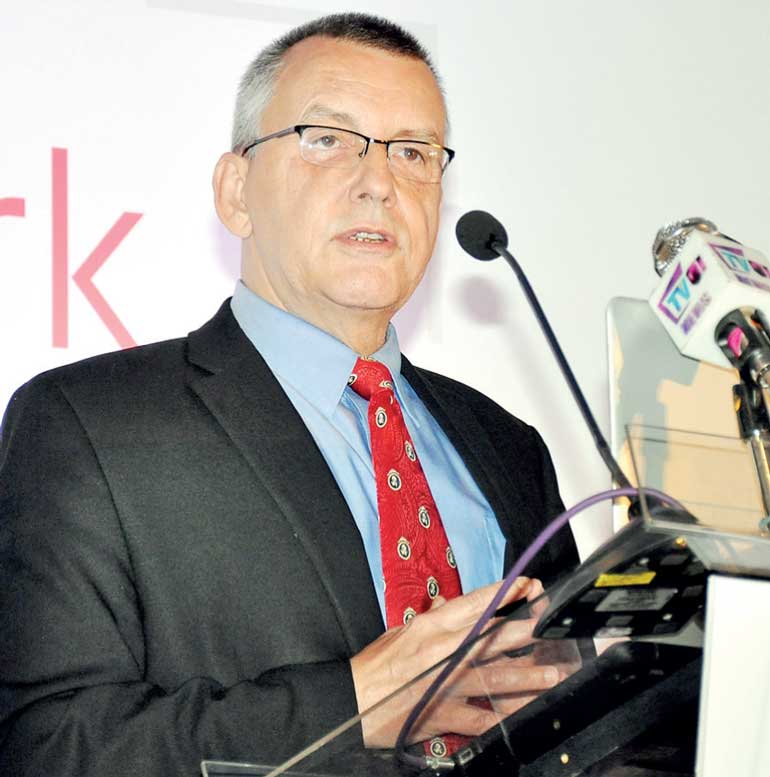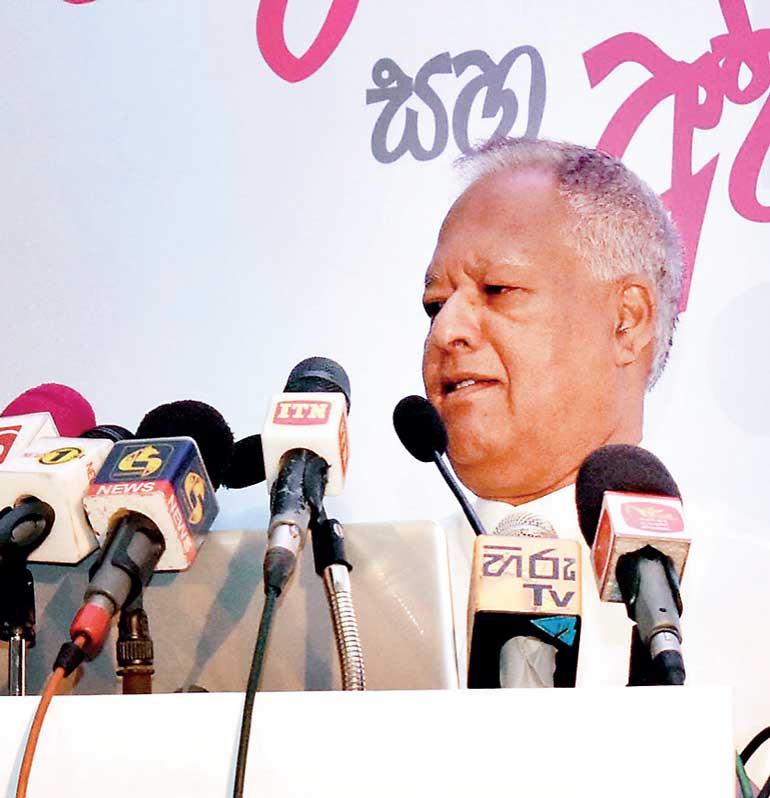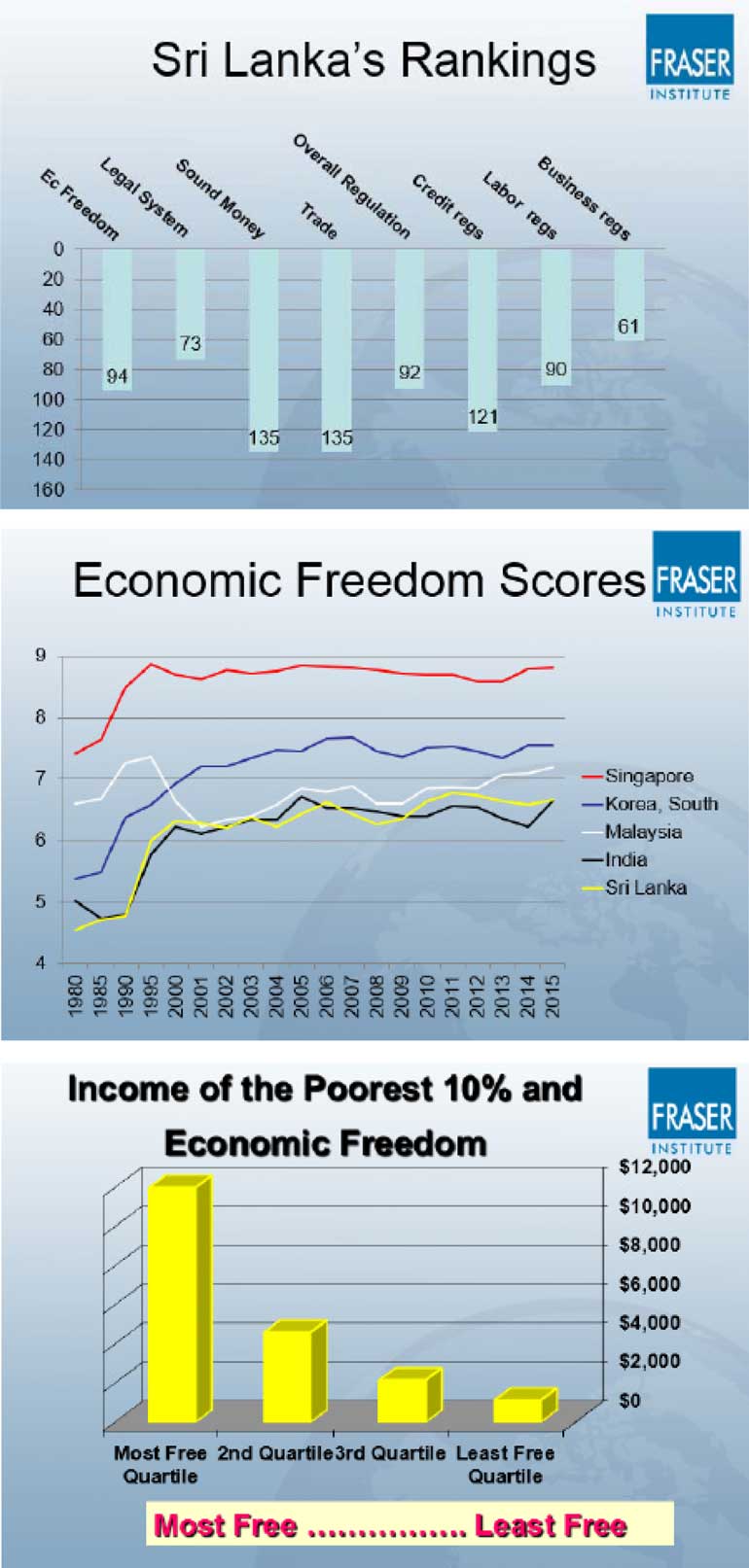Thursday Apr 24, 2025
Thursday Apr 24, 2025
Monday, 16 October 2017 00:00 - - {{hitsCtrl.values.hits}}
Advocata: Sri Lanka’s poor stand to gain major benefits if more economic freedoms are given while businesses and foreign investors will also be encouraged, the participants of an economic freedom summit staged by the Advocata Institute, a free market think tank, said.

Dr. Michael A. Walker Research Chair in Economic Freedom Fred McMahon
To understand what economic freedom really means, one has to consider what happens when such liberties are taken away through controls and restrictions, said Rohan Samarajiva, head of LirneAsia, a regional policy research body.
Economic freedom - the unknown ideal
The 1970s closed economy era was a classic example, he said.
“During that time the Government decided what we ate,” Samarajiva told the Economic Freedom Summit organised by the Advocata Institute and Fraser Institute of Canada, which compiles a global index of economic freedom.
“We went to the co-operative shop and if they had harlmasso (dried sprats) we ate harlmasso. If they had karawala (dried fish) that week we had karawala for our meal,” Samarajiva said, speaking in Sinhalese. “If for the New Year the Government allowed sardine (tinned fish) into the country, we had sardines.”
If some rice was taken in a car or other vehicle against the rules set by the State, it was considered a crime and was confiscated by police at a roadblock called harl pol-ler (rice barrier). If chillie was transported it was caught at a miris pol-ler (chillie barrier). Malnutrition and unemployed rose during the period.

Dr. Sarath Amunugama Minister of Special Assignments
Sirimal Abeyratne, professor of economics at Colombo University, said there was little understanding in Sri Lanka about economic freedoms or its effects with many people being taught to think that controls were good.
“People know a lot about political freedoms, but not about economic freedoms,” Abeyratne said.”Economic freedom affects all of us in our daily lives. Many of the controls from the 1970s still exist despite several rounds of liberalisations.”
“There are people who still think that Sri Lanka would be like Singapore if the controls of the 1970s still existed.”
He said there was time when some people marched on the streets saying they were prepared to have tea without sugar. Abeyratne said all laws should apply equally to everyone, like a red light applies to all on the road regardless of the person.
Then economic freedoms will bring benefits and the number of scams will be reduced, he said.
If property was not protected investors will also not come, he said.
There was a misconception that economic freedoms were only good for investors or foreigners, a seminar participant said.
The seminar, conducted in Sinhalese, was the final event of the three-day Economic Freedom Summit.
The event began with a plenary session and closed-door discussions with industrialists and academia as well as policymakers to develop steps to improve economic freedom and create greater prosperity.
Investors and jobs
Minister of Special Assignments, SarathAmunugama, who graced the seminar as the Chief Guest, said around the time of independence there was a belief that a country would make the best use of resources and develop fast if there was central planning by the State.
Some development happened, especially in heavy industries, but later problems emerged.
China was one of the first countries to recognise the problem and under then Prime Minister Zhou Enlai, and later Deng Xiaoping, relaxed many controls.
“They realised that the domestic resources were not enough to take the country forward,” Amunugama said. “Investors are not charities. Immense freedoms have been given to foreign businesses to invest, to hire workers and also the freedom to take away profits to their home countries.”
“Now if you go to Shanghai across the river, you will see massive neon signs. They all advertise multinational brands.”
Vietnam, another socialist country, had achieved major gains by moving away from central planning and controls, he said.
Vietnam started liberalising through its Chính sách Đi Mi (Renewal policy) in 1984, though economic analysts say it took many years for investors to be convinced.
Amunugama said the concept of economic freedom was relative and it did not mean that there was no role for the State or regulation.

Rule of law
Fred McMahon, who manages the Fraser Institute Economic Freedom project, said the freedom of one person should be exercised without stepping on the freedoms of others.
“Individuals have economic freedom when the property they acquire without the use of force, fraud, or theft is protected from physical invasions by others,” he said.”They are free to use, exchange or give their property as long as their actions do not violate the identical rights of others.”
In the Fraser Institute Economic Freedom Index, rule of law is a key aspect. Rule of law, which treats everyone equally, will protect the weak from the strong and powerful.
Philosophers have pointed out that those who take away the freedoms of others are usually those who are armed, which is the armed state and gangsters of all kind who may steal and use arms.
Meanwhile, McMahon said Sri Lanka had improved its position on the Economic Freedom of the World Index to 94 out of 159 countries but more benefits will come to the people if controls were relaxed.
Sri Lanka’s legal system had a rank of 73, but on sound money (how good the central bank is in providing low inflation money) it was 135. In free trade also Sri Lanka scored badly at 135 out 159.
“Sri Lanka cannot be a success story by trading with 20 Million people. But Sri Lanka can with few billion people, McMohan said. “
Our performance at 135th out of 159 nations on Trade is not at all satisfactory. Especially for a small island like Sri Lanka.
There was a direct co-relation with economic freedom and prosperity he said.
The average income of the poorest 10 percent of the population of the quarter of countries with the most economic freedom was about 10,000 US dollars a year, he said. But in the countries were least free the bottom 10 percent of people earned about 1,000 US dollars a year.
Countries like Malaysia and Korea scored very high on economic freedom also had high living standards, compared to India and Sri Lanka.
Discover Kapruka, the leading online shopping platform in Sri Lanka, where you can conveniently send Gifts and Flowers to your loved ones for any event including Valentine ’s Day. Explore a wide range of popular Shopping Categories on Kapruka, including Toys, Groceries, Electronics, Birthday Cakes, Fruits, Chocolates, Flower Bouquets, Clothing, Watches, Lingerie, Gift Sets and Jewellery. Also if you’re interested in selling with Kapruka, Partner Central by Kapruka is the best solution to start with. Moreover, through Kapruka Global Shop, you can also enjoy the convenience of purchasing products from renowned platforms like Amazon and eBay and have them delivered to Sri Lanka.
Discover Kapruka, the leading online shopping platform in Sri Lanka, where you can conveniently send Gifts and Flowers to your loved ones for any event including Valentine ’s Day. Explore a wide range of popular Shopping Categories on Kapruka, including Toys, Groceries, Electronics, Birthday Cakes, Fruits, Chocolates, Flower Bouquets, Clothing, Watches, Lingerie, Gift Sets and Jewellery. Also if you’re interested in selling with Kapruka, Partner Central by Kapruka is the best solution to start with. Moreover, through Kapruka Global Shop, you can also enjoy the convenience of purchasing products from renowned platforms like Amazon and eBay and have them delivered to Sri Lanka.